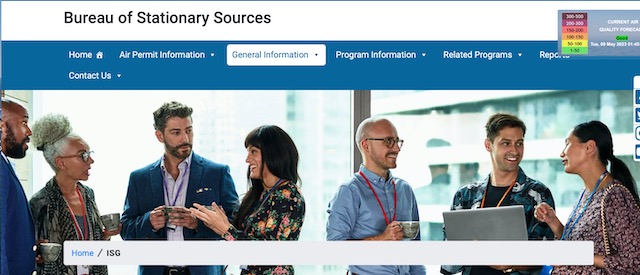“Industrial Stakeholders Group” Explicitly Serves Polluters’ Interests
It seems like at least every day – sometimes twice a day – I get some bullshit email from DEP.
Usually they are over the top self congratulatory heavily spun press releases.
Sometimes they are about another DEP “Stakeholder” group. Those extended Stakeholder processes are just another way to slow walk and do nothing substantively – but deploy all the buzzwords and slogans. That’s the corporate aptured regulatory agency that DEP has become.
DEP’s MO is to keep multiple balls in the air and process everything to death – that assures that you don’t have to actually do anything. The enviro’s love it too, because they can feel important, report back “metrics” to their Foundation funders, and they prefer the inside game to organizing and real work anyway. So, there’s mutualism and symbiosis in action!
Which takes us to the photo above. What’s going on there?
Look at all those hip and diverse DEP staffers! They look like an ad for Starbucks or Apple.
But what are they doing? Hit this link to find out.
That photo is the banner for the “Industrial Stakeholders Group” (ISG). What is the ISG?
I’ve written to criticize it many times as the poster child for regulatory capture (e.g. see this and this).
But you don’t have to take my word for it – just read how DEP openly describes the composition and work of the ISG – and also peruse the ISG agendas and meeting notes to see what is discussed and who attends ISG meetings.
Note especially whose “concerns” the DEP considers and note the absence of any scientific, public interest, academic, environmental, social justice, or public health representatives. Here’s DEP’s explanation:
What is the ISG?
The Industrial Stakeholders Group or ISG focuses on Air Quality Permitting in the State of New Jersey.
The group is composed primarily of DEP air quality permitting staff, DEP air quality enforcement staff and representatives of regulated industries. Attendance is open to anyone with an interest in Air Quality Permits. The group meets quarterly to discuss ways of promoting effective and consistent permits that are protective of the environment and consider the concerns of the regulated community.
How cluelessly captured does DEP have to be to openly admit this? How out of touch?
I’ve also written many times about the DEP’s organizational culture and values that are so perfectly illustrated by that hip and diverse photo, so won’t repeat all that again either (of course DEP espouses those values, given the leadership of the “Erin Brockovich” lawyer and first openly gay Commissioner. Curiously, Gov. Murphy was lying because he failed to note that Commissioner LaTourette is a former corporate lawyer. Oh well.)
In a superb “Insider NJ” piece today on Gov. Murphy’s environmental record, my friend and retired longtime Sierra Club Director Jeff Tittle nails the operative dynamic:
How should New Jerseyans see their governor, a man self-described as both a “progressive” and “cold-blooded capitalist”? Can one be both with any credibility? “Murphy has been able to give himself cover,” Tittel said “Part of it is because he uses social issues as a cover. It was one of the things that I saw happen in the Democratic Party. It started with Hillary [Clinton]. She wanted to go to the left of Bernie, but she couldn’t do it on the environment, economics, and things like that, so she went on the left to him on women’s issues and gay rights. What you see in Murphy–and a lot of corporate Democrats—is that on social issues he looks progressive and meanwhile, on economic issues, he’s pure Goldman Sachs. People think he’s a liberal because he’s pro-choice and he’s talking about gay rights. And meanwhile, the DEP has gotten rid of the Division of Enforcement. It’s now an office under the commissioner, so it’s no longer independent staffing. Murphy’s economic policies and environmental policies are pretty in line with Christie in a lot of ways.”
As I’ve written many times, Tittel is perfectly describing the political-economy that Professor Nancy Fraser calls “Progressive Neoliberalism” (to understand that oxymoron, see this and this).

